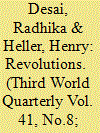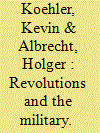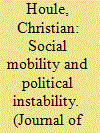|
|
|
Sort Order |
|
|
|
Items / Page
|
|
|
|
|
|
|
| Srl | Item |
| 1 |
ID:
180014


|
|
|
|
|
| Summary/Abstract |
This article analyzes the states of Iran and Egypt before the eruption of revolutionary processes in those countries in 1979 and 2011 respectively. Its aim is to delineate the different roles of the armies as the last lethal and organized bastions of dictatorships during those revolutions. In Egypt, the army successfully protected the Egyptian state from a complete downfall, while in Iran, the army became completely disorganized and shattered. It argues that the extreme personal rule of Iran’s shah [king] within a neo-sultanic framework and his extreme depoliticization of the army rendered it unable to act independently during a revolutionary process. In contrast, the distribution of power between the army and presidential palace within an institutionalized dual military state enabled the army to play a much more definitive role during the revolutionary process in Egypt. Consequently, unlike in 1979 Iran, the army in 2011 Egypt not only saved the pre-revolutionary military dictatorship but restored it in a much more brutal way.
|
|
|
|
|
|
|
|
|
|
|
|
|
|
|
|
| 2 |
ID:
040365


|
|
|
|
|
| Publication |
Ohio, Ohio University Press, 1974.
|
| Description |
xxii, 720p.hbk
|
| Standard Number |
821401602
|
|
|
|
|
|
|
|
|
|
|
|
Copies: C:1/I:0,R:0,Q:0
Circulation
| Accession# | Call# | Current Location | Status | Policy | Location |
| 016172 | 959.7044/CAD 016172 | Main | On Shelf | General | |
|
|
|
|
| 3 |
ID:
145545


|
|
|
|
|
| Publication |
New Delhi, Adroit Publishers, 2016.
|
| Description |
xviii, 409p.hbk
|
| Standard Number |
9788187393306
|
|
|
|
|
|
|
|
|
|
|
|
Copies: C:1/I:0,R:0,Q:0
Circulation
| Accession# | Call# | Current Location | Status | Policy | Location |
| 058693 | 320.5496/TOF 058693 | Main | On Shelf | General | |
|
|
|
|
| 4 |
ID:
190019


|
|
|
|
|
| Summary/Abstract |
When are mass protest movements able to overthrow authoritarian regimes and promote democratic transitions? This article considers whether socially diverse protest movements are more conducive to democratization than movements restricted to one or a few social groups. Coalitions across social groups should impose higher costs on authoritarian regimes through access to a wide range of resources, strategies and sources of leverage. Heterogenous protest coalitions are also more likely to socially overlap with regime supporters and the security forces, which should encourage regime splits and defections. But, diverse protest movements may also be more vulnerable to fragmentation and in-fighting, which may particularly threaten prospects of democracy in the aftermath of an authoritarian regime breakdown. Analyzing new global data mapping the social group composition of anti-regime protest campaigns from 1900 to 2013, the article finds consistent evidence that socially diverse protest movements are more likely to overthrow authoritarian regimes, and this is not driven by protest size. Socially diverse movements are also more likely to end in the short- and long-run establishment of more democratic institutions, suggesting that heterogenous protest movements’ potential for bringing about democracy is more promising than expected. These findings speak to the importance of securing broad and not only large mass movements to promote democracy.
|
|
|
|
|
|
|
|
|
|
|
|
|
|
|
|
| 5 |
ID:
173434


|
|
|
|
|
| Summary/Abstract |
We held the ‘Revolutions’ conference in 2017 to commemorate the Russian Revolution and redeem the actual record of revolutions in the Third World for the left. A quarter-century after the demise of the USSR, we found liberal capitalist triumphalism unwarranted. Two of the most important expectations to which it gave rise – that the world had become ‘unipolar’ and that it would enjoy a ‘peace dividend’ – remained unfulfilled. Instead, the world became multipolar and the West, led by the United States, engaged in unprecedented economic and military aggression against countries that contested its power. If this were not enough, social unrest and explosions in the First World as well as the Third underlined the relevance of revolutions. To trace their lineage, we recall capitalism’s intimate relation with revolution. It has needed revolutions to usher it into history and to usher it out. In addition to revolutions against developed capitalism, we also underline how important and necessary revolutions against nascent capitalism in various parts of the world have been. The contributions in this volume explore different parts of this lineage and vivify revolutions for our time.
|
|
|
|
|
|
|
|
|
|
|
|
|
|
|
|
| 6 |
ID:
177007


|
|
|
|
|
| Summary/Abstract |
This article presents a systematic analysis of military coups following popular mass uprisings in nondemocratic regimes, conceptualized as endgame coups. Drawing on our original, medium-n data set of revolutionary situations, we find that such endgame coups form a distinct type of military intervention in politics. Compared to regular coups, episodes of popular mass contestation prompt conservative interventions in politics of the military’s leadership aimed at preserving the regime’s authoritarian infrastructure. A systematic test of factors characterizing postcoup political trajectories is based on Cox proportional hazard models and provides empirical evidence in contrast to the widely held notion of “democratic coups.” Our findings reveal that endgame coups are conservative rollback coups, executed by military leaderships, that result in continued political instability and illiberal politics.
|
|
|
|
|
|
|
|
|
|
|
|
|
|
|
|
| 7 |
ID:
163436


|
|
|
|
|
| Summary/Abstract |
Does social mobility foster political stability? While there is a vibrant literature on the effect of economic inequality on political unrest, the recent literature has remained silent about the effect of social mobility on instability. Yet, inequality and social mobility, although related, are fundamentally distinct, and immobility is likely to be perceived as even more unfair than inequality, meaning that it may generate at least as much grievances. In this article, I argue that social immobility fuels political instability. To test this hypothesis, I develop an indicator of social mobility covering more than 100 countries worldwide. I then conduct the first large-N cross-national test of the effect of social mobility on political instability to date. Consistent with my argument, I find that countries with low social mobility levels are more likely to experience riots, general strikes, antigovernment demonstrations, political assassinations, guerillas, revolutions, and civil wars.
|
|
|
|
|
|
|
|
|
|
|
|
|
|
|
|
|
|
|
|
|